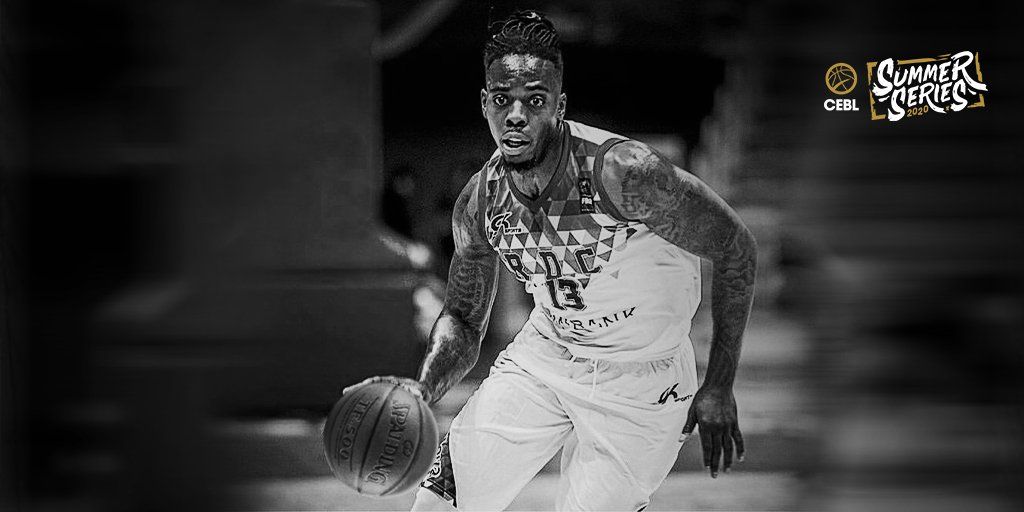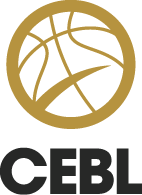The Marathon Continues: Eric Kibi's Story
July 22, 2020
CEBL Team
Written by Eric Kibi, Ottawa BlackJacks player and aspiring journalist.

The Canadian Elite Basketball League is a movement that brings Canadians together through a new basketball experience. As the league prepares to be the first professional sports league in Canada to reunite sports and passionate fans through the CEBL Summer Series later in July, the CEBL caught up with Ottawa BlackJacks Forward, Eric Kibi.
“The marathon continues” is one of my favourite quotes that has motivated me for many years. The quote itself comes from one of my favourite rappers, Nipsey Hussle. Unfortunately, Nipsey was killed March 31, 2019. I still remember the date and exactly where I was at the time. Nipsey also happens to be part of my 60-plus tattoos I carry on my body, that’s how much his music meant to me since I started listening to him in 2007.
Pre-Game Introduction: The Beginning
I was born in Quebec City, in 1990 to proud Congolese immigrants, Nlombi Kibi and Jeanne Onokoko. My parents were born worlds and miles apart in Congo. They barely even spoke the same language in a country that has 11 different dialects. The Democratic Republic of Congo has a population of 85 million people and is the 11th largest country in the world. For decades, Congo has been torn apart by war. As recently as 1960, Congo was still being colonized by Belgium. In 2020, we are celebrating 60 years of independence.
My parents both came from very strict households that put a huge emphasis on academics despite all the turmoil. The Congolese dream, for most young Africans, has always been to escape poverty and go make a better life in Europe or North America. My father, Nlombi, at the age of 19, was the second highest rated student in all of Congo. He aspired to be an engineer. Also, in the Top 10 in all of Congo was my mother, Jeanne, who ranked ninth. She was the only woman in the Top 20. As distinguished students, this earned both of my parents, along with eight other students, a scholarship to go study at Laval University in Quebec City during the fall of 1981.
In August of 1990, the marathon started. I was born in Quebec in a huge tight-knit Congolese community. I lived in Quebec until the age of seven. The community and education that I was surrounded by up until that age gave me the pride that I have today for Congo. I started playing basketball at the age of six. I knew more basketball than English at the time. In Quebec, basketball was not very popular. In our Congolese community, most of our fathers developed a huge love for hockey, especially the rivalry between the Montreal Canadiens and the Quebec Nordiques. Some of my earliest memories are going with my father to gatherings where 50-60 of my uncles would be there watching and arguing about this heated hockey rivalry. There was almost no space for basketball.
1st Half:
I moved to Ottawa at the age of seven. This is where my love for basketball took off. I started playing organized basketball and I began to develop a huge competitive fire that still drives me today. I started watching more NBA basketball, specifically Michael Jordan and Congo’s very own Dikembe Mutombo. As the years went on and I started to become much better. I started to believe that basketball could be my future. At this time, during my high school years, playing for Congo had never crossed my mind, it seemed so far-fetched.
With the social injustices we are experiencing today, I can say that most of the time, I was the only Black man in my community, my school and my team. I loved my Congo of course, and every time I was home with my family, I felt like I was in Congo - whether it was our music, our food or our language, the problem was on the outside. The community I grew up in, whether in Quebec City or Ottawa, was never intentionally racist, but I knew from aged 11 to 16 that I wasn't fully comfortable being as loud about my Congolese heritage like I am today. Some of my best friends were white, but they cannot and will never understand how difficult my challenge could be. I remember bringing traditional Congolese food that my parents had cooked for lunch, such as foufou or poundu. I would be teased. These moments helped me realize the kind of difficulties my parents probably faced being alone in Canada at the age of 20, in a brand-new culture. It also prepared me for what would come next in my professional adventures. Don't get me wrong, Canada is the best gift my parents could have ever given me and every day I am thankful to have been born in this country, but these are realities that immigrants face worldwide.
A the age of 15, having been in Ottawa for almost 10 years and having built a dream of becoming a professional basketball player, (which at the time seemed impossible, especially coming from little known Ottawa), I came up with a crazy plan that was refused by my mother a minimum of three times. I asked my mother to let me go play basketball in the United States to gain more exposure with a NCAA Division 1 scholarship. She thought I was crazy. Eventually, she gave in and decided to let me go and the rest was history. Scholarship obtained. I reached many of my personal goals, which included first and foremost getting a degree, playing in the March Madness and ultimately, becoming a pro.
2nd Half:
Fast forward to 2016, I am into my fifth professional season. At this particular time, I am playing in Denmark. By now, I have already played in four different countries throughout my career but to date, I was having my best season. This caught the attention of the Congolese National team who found out I was of Congolese origin. They contacted me and from there, we got the ball rolling to me obtaining a Congolese passport to join the National team for the first time in June 2017, a complicated process that took almost an entire year.
In June 2017, I arrived in Kinshasa, Congo for the first time. Just like prior life-changing decisions, my mother strongly opposed me going to play for Congo, to the point where the General Manager flew to Montreal to have a sit-down talk with my mother which eventually re-assured her about the whole process. Once in Kinshasa, I finally understood why I was not feeling comfortable at the age of 11 to be open about my heritage. The reason? Canada is where I was born, but Congo is in my blood. Once I arrived in Congo, it was clear that I was finally home after 26 years. I met uncles, aunts and cousins that I thought I would never meet. I saw where my father attended university and where he walked six miles every day to go sit on an uncomfortable dirty bench just to study and give himself (and myself) a chance at a better life. Going home to Congo gave me the feeling that we had an obligation as a Congolese National team to do something special for our country and become ambassadors.
What Congo gave me was more than reaching the 2017 Afrobasket quarter-final for the first time since 1960, more than winning the 2019 AfroBasket title or even meeting the president and receiving personalized Range Rovers or six-figure bonus prizes. What Congo gave me is an understanding about the sacrifices my parents, and many other immigrant parents, did for their children. They gave us an opportunity to be that second generation to will fight for change in our own countries so that our kid’s generation will be able to see benefit from our struggle. For us to feel like it is okay to be a leader and fight for what we believe in.
Overtime:
Now in 2020, I feel more than ever in my prime of basketball. They say 30 is the beginning of the end for pro athletes. I say 30 is just halftime to the final destination of the marathon. Now having played in 10 countries, I’m again back home ready to represent my hometown once again. I’m ready to bring my experience, leadership and toughness to our group. I have had difficult life experiences in Iraq, South America, Serbia and obviously Africa, so being home is a bonus and always a great feeling. It makes everything worth it. These experiences have turned me into a man that is so hungry and driven to succeed that I rarely sleep anymore, you can ask my close ones. I’m ready to help the BlackJacks bring home a championship and keep my marathon going.

